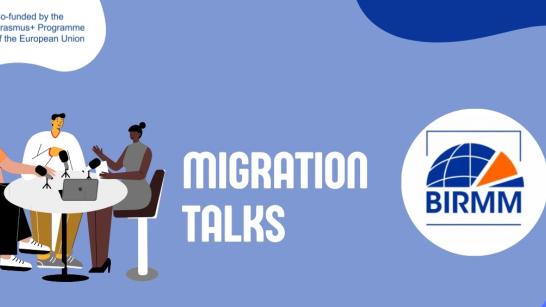
Welcome to the podcast “Migration Talks”. This podcast presents and discusses migration research conducted by VUB and non-VUB scholars in an easily understandable language. The podcast is organised by BIRMM, in cooperation with the Jean Monnet Chair ‘Expand – Understanding Resilience in EU Justice and Home Affairs’.
PODCAST 1: RECEIVING AND ACCOMMODATING REFUGEES IN EUROPEAN CITIES : WHAT SHALL – AND SHALL NOT – BE DONE?
In the first episode, we discuss how refugees are received and accommodated in European cities. This is a topical issue in Brussels, which has witnessed a reception crisis. In late 2021, refugees had to sleep on the streets in front of Belgium’s biggest reception centre due to a lack of accommodation. The Belgian federal instances failed to provide more place until the city of Brussels stepped in and offered hotel rooms. This situation raises question of wider relevance: Who is responsible for welcoming and accommodating refugees? Are there differences in the ways in which this is handled across Europe?
Hannah Vermaut (BIRMM coordinator) and Florian Trauner (BIRMM co-director and JM Chairholder) welcome two VUB researchers, who are highly qualified to discuss these questions: René Kreichauf (Cosmopolis Centre for Urban Research - VUB) and Louise Hantson (project researcher at BIRMM for the Whole COMM project).
The first episode is available here.
Want to read more on René Kreichauf's research?
Kreichauf, R. & Mayer, M. (2021). Negotiating urban solidarities: multiple agencies and contested meanings in the making of solidarity cities, Urban Geography, DOI: 10.1080/02723638.2021.1890953 pdf fileKreichauf & Mayer (2021).pdf (767 KB)
Kreichauf, R., Rosenberger, O. and Strobel, P. (2020). The Transformative Power of Urban Arrival Infrastructures: Berlin’s Refugio and Dong Xuan Center. Urban Planning, 5(3), 44-54. pdf fileKreichauf et al. (2020).pdf (954 KB)
Kreichauf, R. (2018). From forced migration to forced arrival: the campization of refugee accommodation in European cities. Comparative Migration Studies, 6(7), https://doi.org/10.1186/s40878-017-0069-8 pdf fileKreichauf (2018).pdf (4.65 MB)
You can follow Louise Hantson's research on the Whole-Comm website and you can read an interview on what the Whole-Comm research project is about.
PODCAST 2: BIG DATA AND ARTIFICIAL INTELLIGENCE FOR MIGRATION RESEARCH
In the second episode, we discuss the potential and the risks of using big data and artificial intelligence (AI) for migration research. Asylum and migration authorities all over the world start to use more and more big data and AI. The European Asylum Support Office for instance uses machine learning to predict pressure on the asylum administrations of EU member states.
It’s not only authorities that look at the potential of big data. New data sources such as mobile phones, digital applications and social media, as well as satellites can help creating new and more detailed insights into human mobility. Should researchers use these opportunities? Or do they risk repeating or contributing to the downsides of big data – such as a loss of privacy?
Florian Trauner (BIRMM co-director and JM Chairholder) welcomes Tuba Bircan (research professor at Interface Demography - VUB) to discuss these questions.
The second episode is available here.